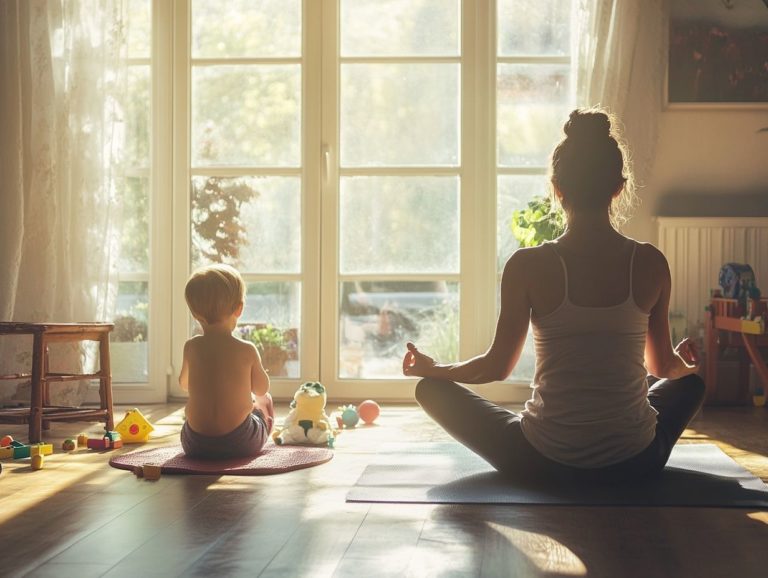10 Mindful Parenting Quotes to Inspire You
Contents
- Mindful Parenting: Inspiring Quotes for Positive Growth
- Parenting Insights: The Importance of Modeling Behavior
- 2. “Your children will become what you are; so be what you want them to be.” – David Bly
- 3. “The greatest gifts you can give your children are the roots of responsibility and the wings of independence.” – Denis Waitley
- 4. “It’s not our job to toughen our children up to face a cruel and heartless world. It’s our job to raise children who will make the world a little less cruel and heartless.” – L.R. Knost
- 5. “The way we talk to our children becomes their inner voice.” – Peggy O’Mara
- 6. “Your children are not your children. They are the sons and daughters of Life’s longing for itself.” – Khalil Gibran
- 7. “The best way to make children good is to make them happy.” – Oscar Wilde
- 8. “Parenting is not about perfect execution, it’s about learning and growing with your child.” – Unknown
- 9. “The more that you read, the more things you will know. The more that you learn, the more places you’ll go.” – Dr. Seuss
- 10. “Children are not a distraction from more important work. They are the most important work.” – C.S. Lewis
- How Can Mindful Parenting Benefit Your Child’s Development?
- How Can Mindful Parenting Help with Parent-Child Communication?
- What Are Some Common Misconceptions About Mindful Parenting?
- Frequently Asked Questions
- What are some inspirational mindful parenting quotes?
- How Can Mindful Parenting Quotes Inspire You?
- Why Is It Important to Practice Mindful Parenting?
- Can I Use Mindful Parenting Quotes in My Daily Life?
- Who Can Benefit from Reading Mindful Parenting Quotes?
- Where Can I Find More Mindful Parenting Quotes?
Mindful Parenting: Inspiring Quotes for Positive Growth
Parenting is a journey brimming with both challenges and triumphs. The words you choose to guide your children can profoundly shape their futures. Navigating this journey requires patience, understanding, and a deep connection with your child’s emotions.
This article delves into ten impactful and inspirational quotes that capture the essence of mindful parenting. From nurturing independence to fostering kindness, these insights are designed to inspire you to create a positive environment that supports your child’s development and mental well-being.
Each quote acts as a poignant reminder of the significance of your actions and words. They prompt you to reflect on your parenting approach and its lasting effects. These quotes offer not just advice, but also motivational insights that can empower you as a parent.
Explore with us as we uncover the wisdom behind these powerful statements. Discover how embracing mindful parenting can transform your family’s dynamic for the better. Learn how to integrate love, discipline, and joy into your everyday interactions.
Key Takeaways:

- Our words and actions as parents greatly impact our children’s inner voices and self-perception.
- Modeling the behavior we want to see in our children is crucial for their development and emotional well-being.
- Teaching responsibility and fostering independence are valuable gifts we can give our children. These lessons help in building trust and understanding.
1. “The way we talk to our children becomes their inner voice.” – Peggy O’Mara
The way you communicate with your children profoundly shapes their inner voice, influencing their self-perception, emotional well-being, and the values they develop as they grow. This crucial aspect of parenting underscores the significance of effective communication and understanding.
Your words can convey love, support, and trust elements vital for healthy emotional development. Parenting styles that focus on positive communication can also aid in reducing difficult behaviors and promoting a calm home environment.
By fostering a positive dialogue, you empower your children to navigate life s challenges with compassion and confidence. This helps them cultivate a strong sense of self-worth and the understanding of how to thrive.
Experts like Amy Morin and Sarah Scott highlight that positive affirmations can significantly enhance a child’s belief in themselves. They reinforce the notion that they are both capable and valued. Haim G. Ginott points out that effective communication goes beyond words; it involves understanding how others feel and recognizing a child’s feelings as entirely legitimate.
By employing techniques such as active listening and constructive feedback, you can strengthen emotional connections. This allows your children to express themselves freely, building their confidence and creating a safe space for them to share.
Positive reinforcement is a powerful tool in your parenting toolkit. It encourages good behavior and fosters a growth mindset, shaping your child’s self-image and resilience. By being mindful of your language and approach, you can nurture a generation of emotionally intelligent individuals and create a positive and supportive family dynamic.
Parenting Insights: The Importance of Modeling Behavior
2. “Your children will become what you are; so be what you want them to be.” – David Bly
As a parent, you wield a strong influence over your child’s development. Your actions and attitudes shape their behavior and values. They are likely to mirror the characteristics you display, making it crucial to model positive behavior with intention.
Your ability to handle stress, show empathy, and maintain calm can significantly impact their emotional resilience. This idea shows that parenting is more than just guidance; it s about embodying the principles you wish to instill in your children, such as love, responsibility, and trust. By creating an environment where they feel safe to learn and grow, you enhance their mental well-being and equip them with essential life skills.
Experienced parenting experts like Barbara Kingsolver, Kristen Crockett, and Eileen Kennedy-Moore emphasize that by demonstrating these values, you not only nurture strong family bonds but also lay the groundwork for your children’s social interactions and emotional intelligence. When you show kindness, empathy, and resilience in the face of life s challenges, you inspire similar traits in your offspring, ultimately fostering their self-confidence and compassion.
The long-term impact of this behavior is profound. Children who observe their parents navigating life with integrity are more likely to adopt these values themselves. This positively influences their relationships and decisions throughout adulthood. It also promotes a strong sense of self-worth and the ability to handle future challenges with confidence.
3. “The greatest gifts you can give your children are the roots of responsibility and the wings of independence.” – Denis Waitley
The dual gifts of responsibility and independence are crucial for nurturing healthy development in children. These skills equip them to navigate life s challenges effectively. When you instill a sense of responsibility in your child, you help them understand the weight of their actions and decisions. On the other hand, granting them independence empowers them to explore, learn from their experiences, and ultimately evolve into confident adults. This balance is key for their long-term success and personal growth.
Striking this balance is a fundamental aspect of effective parenting, paving the way for emotional resilience and positive relationships. It develops a strong sense of self-worth and equips your child to handle life’s challenges with confidence and grace.
Encouraging your child to take on age-appropriate tasks, such as managing their own homework or assisting with household chores, significantly contributes to these essential traits. Dr. Louise Hart emphasizes the importance of guiding children in a way that allows them to recognize their capabilities, stating that “children need opportunities to practice responsible decision-making in a safe environment.” This approach fosters accountability and empowers them to make informed decisions.
Incorporating activities like setting personal goals and promoting problem-solving deepens their understanding of accountability. As Henry Cloud notes, fostering independence while providing appropriate support creates a solid foundation for success. This enables your child to become proactive rather than reactive in various aspects of their lives, building their resilience and sense of responsibility.
4. “It’s not our job to toughen our children up to face a cruel and heartless world. It’s our job to raise children who will make the world a little less cruel and heartless.” – L.R. Knost
In your journey of parenting, your role goes beyond simply preparing your children to face a challenging world; it s about nurturing compassionate individuals who can make a difference and spread kindness wherever they go. This philosophy helps them understand their feelings better and fosters the emotional connections necessary for navigating hardships.
By empowering them to enact change and cultivate connections rooted in understanding and love, you are raising a generation that strives to create a better world.
Your daily interactions are filled with opportunities to model empathy and understanding. Engage your children in conversations about their feelings, guide them to recognize the emotions of others, and encourage acts of kindness, like sharing or helping a friend.
These practices effectively reinforce these important values and foster a deep sense of connection.
Wisdom from figures like Maya Angelou and John Holt serves as a poignant reminder: I ve learned that people will forget what you said, people will forget what you did, but people will never forget how you made them feel. This insight highlights that emotional connections forged through kindness leave a lasting impression.
Jim Valvano s emphasis on the significance of caring in life encourages you to celebrate the joy found in both giving and receiving compassion. This ultimately shapes your children into empathetic, kind-hearted individuals.
This approach also helps children better understand the world around them and strengthens their ability to build meaningful relationships.
5. “The way we talk to our children becomes their inner voice.” – Peggy O’Mara
The way you communicate with your children profoundly shapes their inner voice and influences how they see themselves, their emotional well-being, and the values they develop as they grow. This crucial aspect of parenting underscores the importance of effective communication and understanding.
Your words can convey love, support, and trust elements vital for healthy emotional growth.
By nurturing a positive dialogue, you’re empowering your children to tackle life’s challenges with compassion and confidence, helping them cultivate a robust sense of self-worth and the emotional skills needed to thrive.
Research by experts like Amy Morin highlights that language, particularly positive reinforcement, plays a pivotal role in fostering resilience and self-esteem in children. Morin emphasizes, “Every word you say has the power to either lift your child up or bring them down,” reminding you of the weighty responsibility that comes with parenting.
Haim G. Ginott, a distinguished child psychologist, points out the importance of emotionally connecting through your words, stating, “Children are like wet cement; whatever falls on them makes an impression.” This makes it essential for you to use effective communication techniques, such as active listening and affirming their feelings.
By validating their experiences and offering constructive feedback, you can help lay an unshakable foundation for your children’s emotional health and self-image.
6. “Your children are not your children. They are the sons and daughters of Life’s longing for itself.” – Khalil Gibran

Recognizing that your children are individuals on their own unique journeys helps you approach parenting with a deep sense of understanding and respect for their individuality. This perspective makes them feel valued for who they are. Ultimately, it guides them in their quest for self-discovery.
Encouraging this autonomy helps them build self-confidence and trust in their abilities. By embracing their uniqueness, you cultivate a deeper connection and build a supportive relationship rooted in love and trust.
This also enhances their mental well-being and emotional growth, making them feel secure and empowered. Acknowledging this individuality is essential not only for their emotional health but also for their ability to forge healthy relationships with peers and family members.
Parenting experts like L.R. Knost and Sarah Scott emphasize that when children feel accepted for their unique traits and preferences, they are much more likely to develop self-confidence and resilience. Kristen Crockett also emphasizes recognizing each child’s personality, as this understanding encourages open communication, emotional expression, and a sense of comfort.
This approach not only creates a nurturing home environment but also equips your children with the skills necessary to navigate social interactions effectively, promoting their overall well-being and happiness.
7. “The best way to make children good is to make them happy.” – Oscar Wilde
Prioritizing your children’s happiness is fundamentally intertwined with their emotional well-being and overall development. Studies have shown that joy and laughter play crucial roles in shaping positive behavior and character. Creating a joyful environment is crucial! You foster growth and empower your children to engage with the world around them positively and meaningfully.
Experts like Eileen Kennedy-Moore emphasize the importance of incorporating play into daily life, highlighting how imaginative activities can enhance emotional expression and resilience. Mitch Albom notes that laughter acts as a bonding agent, creating connections that nurture self-esteem and security.
You can cultivate this atmosphere by being emotionally available, encouraging open conversations about feelings, and tapping into humor that resonates with your children. By actively engaging in play and providing unwavering emotional support, you help your children build a strong foundation for happiness and laughter that lasts well into adulthood.
8. “Parenting is not about perfect execution, it’s about learning and growing with your child.” – Unknown
The journey of parenting unfolds as a continuous learning experience, where you and your children grow together through challenges and shared moments, rather than striving for a perfect execution of parenting techniques. This perspective encourages resilience and adaptability, fostering a dynamic relationship built on trust and understanding.
By embracing this journey, you create a nurturing environment that ultimately guides your children toward successful development, emotional well-being, and a sense of empowerment. Experts like John Holt, Harold Hulburt, and Amy Morin highlight the need for flexibility in your parenting style.
They recognize that children are not static beings; they are dynamic individuals who require different approaches as they grow. Holt encourages you to see your role as a facilitator of learning rather than a strict enforcer of rules. Meanwhile, Hulburt highlights the importance of adapting to your child’s developmental stages for effective parenting.
This fluidity allows you to respond to your children s evolving needs, creating an atmosphere where exploration, discovery, and awareness can thrive. In doing so, you cultivate a deeper bond between you and your child, enriching the parenting experience for both of you.
In conclusion, embracing your children’s individuality, prioritizing their happiness, and maintaining a flexible parenting approach are essential for fostering their emotional well-being and personal growth. By doing so, you not only nurture their development but also strengthen the bond you share with them.
9. “The more that you read, the more things you will know. The more that you learn, the more places you’ll go.” – Dr. Seuss
Encouraging a love for reading in children is one of the most powerful ways to support their development. It opens up a world rich with knowledge, creativity, and opportunities for growth.
Reading not only enhances their vocabulary but also deepens their understanding of emotions, relationships, and the world around them. By nurturing this passion for literature, you give your children the power to embrace learning as a lifelong journey, laying the groundwork for success in various aspects of life.
Engaging with influential figures like Dr. Seuss, Bill Ayers, and Nishan Panwar highlights the transformative power of storytelling in shaping young minds. They assert that engaging narratives stimulate imagination and critical thinking.
These skills are essential for both personal and academic achievement. You can create a cozy reading nook to ignite your child’s passion for books!
Set aside regular reading time together and participate in local library events. Open discussions about favorite characters and storylines can further nurture your child’s comprehension and emotional intelligence.
By weaving reading into the fabric of daily life, you help cultivate resilient, empathetic individuals who are well-prepared to thrive in an ever-changing world.
10. “Children are not a distraction from more important work. They are the most important work.” – C.S. Lewis
Recognizing that children are your most important work transforms parenting from a mere task into a profound journey. It highlights the vital importance of nurturing their emotional well-being and growth.
This perspective elevates your role as a parent to that of a critical figure in your child’s life, reinforcing the necessity of trust and connection.
By dedicating time and effort to this significant work, you lay the foundation for lifelong relationships and emotional resilience within your children.
By actively engaging with them, you can strengthen these essential bonds. This fosters not only understanding but also joy in your daily interactions.
Influential figures like Robert Fulghum and Barbara Kingsolver stress the importance of play and creativity. These activities cultivate a deeper connection with your child.
Similarly, Eileen Kennedy-Moore emphasizes open communication and emotional validation. She encourages you to listen and respond authentically to your child’s needs.
When you implement these strategies, you create an environment where your child feels safe expressing themselves. This ultimately leads to a nurturing relationship that benefits both of you and fosters care.
How Can Mindful Parenting Benefit Your Child’s Development?
Mindful parenting serves as a transformative approach that enriches the emotional skills and well-being of your children. It also deepens the bond you share, fostering their overall growth.
By embracing mindfulness, you cultivate a heightened awareness of your responses, emotions, and behaviors. This creates a nurturing environment that encourages growth, trust, and belief in their abilities.
This method empowers your children to develop self-awareness and resilience. It equips them with essential skills for navigating life’s complexities.
Incorporating mindfulness principles into your daily routines can be remarkably straightforward. It could be as simple as carving out a few moments each day to practice deep breathing exercises with your children.
Establish a dedicated time for family discussions where everyone feels heard and valued. Creating an opportunity for shared mindfulness activities can also be beneficial.
Experts like Dr. Louise Hart and Henry Cloud assert that these small yet significant strategies can profoundly enhance the emotional intelligence of young ones. They teach children to better understand and articulate their feelings.
Kevin Heath further underscores the long-term benefits of this practice. Children raised in a mindful environment tend to show increased concentration, improved social interactions, and a heightened sense of empathy towards others.
Ultimately, this cultivates a healthier emotional landscape for future generations.
What Are Some Mindful Parenting Techniques to Try?

Implementing mindful parenting techniques can significantly enhance your relationship with your child, fostering a deeper awareness of emotions and creating a supportive atmosphere for growth and learning. These techniques encourage open communication, patience, and empathy, allowing you to connect with your child on a more profound level.
By embracing practices such as active listening, responsive communication, and emotional validation (acknowledging and affirming your child s feelings), you can effectively nurture your child’s emotional skills, fostering a sense of comfort and security.
This approach not only helps your child articulate their feelings but also instills a sense of security and trust. Experts like Haim G. Ginott and Peter Krause emphasize the importance of reflective communication, where you mirror your child s emotions. This validation promotes healthier emotional processing.
Incorporating breathing exercises can serve as a calming tool for both you and your child, helping to ground you during moments of stress. Eileen Kennedy-Moore highlights that these techniques help kids understand emotions better, which is crucial as they navigate their social environments.
Imagine guiding your child through life’s challenges with compassion and understanding! By integrating these mindful practices, you are well-equipped to foster your child’s growth.
How Can Mindful Parenting Help with Discipline?
Mindful parenting is essential for developing effective discipline strategies grounded in understanding and emotional awareness. This approach focuses on compassion rather than punitive measures.
Embracing mindfulness in your approach to discipline allows you to respond to your child’s behavior with compassion, creating an environment where their emotions are recognized and valuable lessons are learned. This method enhances communication, paving the way for constructive discussions that foster understanding and growth.
When conflicts arise, utilize techniques such as active listening and acknowledging your child’s feelings. This transforms a potentially volatile situation into a valuable teachable moment. For instance, if your child is upset about having to share toys, a mindful response might involve first validating their feelings by saying, “I can see that you’re really upset about sharing right now.” This acknowledgment helps your child feel heard, setting the stage for collaborative problem-solving.
Experts like Jim Valvano and Barbara Kingsolver highlight the significance of love and connection in the teaching process, while L.R. Knost and Kevin Heath promote gentle guidance over punishment. This illustrates that mindful parenting not only addresses behavioral challenges but also nurtures emotional intelligence and problem-solving abilities in your child.
What Are the Long-Term Effects of Mindful Parenting?
The long-term effects of mindful parenting extend well beyond childhood, shaping your children into emotionally intelligent and resilient individuals. By fostering emotional skills and understanding their own feelings, mindful parenting equips your children with the essential tools to handle life’s challenges and navigate social dynamics with ease.
Experts such as Mitch Albom, Barbara Kingsolver, and Sarah Scott emphasize that practicing mindfulness models emotional regulation. It also cultivates a supportive atmosphere where your children feel valued and understood.
Research indicates that children raised in such environments are more likely to develop empathy and the capacity to cope with stress, leading to greater academic and social achievements.
These attributes foster self-confidence and a sense of agency, giving your children the power to face future challenges with a resilient mindset. Thus, the impact of mindful parenting resonates throughout your child’s life, enhancing not just their individual well-being but also contributing to healthier relationships in adulthood.
Start today! Integrate these techniques into your daily interactions and watch your child flourish.
How Can Mindful Parenting Help with Parent-Child Communication?
Eileen Kennedy-Moore suggests that mindful communication practices are essential for healthy relationships.
Mindful parenting can significantly elevate your communication with your child, creating an understanding environment built on trust and emotional awareness. This leads to more meaningful interactions. By embracing mindful practices, you learn to listen actively and respond thoughtfully, creating a safe space where your child feels comfortable expressing their thoughts and feelings.
This approach nurtures a deeper emotional bond and equips your child with effective communication skills that are essential for their social development.
Experts like Peter Krause and Jane Nelson highlight the importance of being fully present and engaged during conversations. This engagement enables you to pick up on those subtle nonverbal cues and emotional tones that matter so much. Harold Hulburt suggests using reflective listening techniques, such as paraphrasing your child’s words to demonstrate understanding and validation.
Incorporating activities like family meetings encourages your child to share their opinions in a structured yet open environment.
By adopting these strategies, you not only strengthen your relationship with your child but also model vital communication habits that will benefit them throughout their lives. As Haim G. Ginott once said, “Communication is the key to a strong parent-child relationship.”
What Are Some Common Misconceptions About Mindful Parenting?
Understanding common misconceptions about mindful parenting is crucial for effectively navigating your parenting journey. Maya Angelou once said, “When you know better, you do better,” highlighting the importance of understanding and correcting these misconceptions. This understanding allows you to confront cultural myths and biases that might diminish its transformative benefits.
Many people mistakenly think that mindful parenting equates to being overly permissive or neglecting to set boundaries. As Nishan Panwar wisely noted, “Mindful parenting is about setting boundaries with love and understanding.” In truth, it champions respect, understanding, and clear communication that are crucial for your child’s growth, all while providing the necessary structure and guidance.
Experts like Amy Morin and Kevin Heath underline that mindful parenting is less about rigid rules and more focused on fostering resilience and emotional intelligence in children. Morin points out that it involves being fully present with your children, listening to their needs, and responding with empathy instead of reacting impulsively.
Heath and Eileen Kennedy-Moore note that while mindful parenting encourages flexibility, it also stresses the importance of establishing boundaries that help children feel safe and secure. By debunking these myths, you can create a nurturing environment that supports your child’s growth and enhances your own well-being, ultimately leading to healthier family dynamics.
Frequently Asked Questions
What are some inspirational mindful parenting quotes?

- “The way we talk to our children becomes their inner voice.” – Peggy O’Mara
- “The most precious gift we can offer others is our presence. When mindfulness embraces those we love, they will bloom like flowers.” – Thich Nhat Hanh
- “Parenting is not about perfect execution, it’s about perfect intentions.” – Dr. Shefali Tsabary
- “You are the bows from which your children as living arrows are sent forth.” – Kahlil Gibran
- “The best way to make children good is to make them happy.” – Oscar Wilde
- “When we are mindful, we become better parents. When we are better parents, we raise mindful children.” – Christopher Willard
How Can Mindful Parenting Quotes Inspire You?
1. Mindful parenting quotes can remind you to slow down and be present with your children.
2. They inspire you to let go of expectations and perfectionism in parenting.
3. These quotes encourage you to be more patient and understanding with your children.
4. They also remind you to show love and compassion to your children, as well as to yourself.
5. Mindful parenting quotes inspire you to be a role model for your children by practicing mindfulness in your own life.
6. They help you focus on the present moment and appreciate the joys of parenthood.
Why Is It Important to Practice Mindful Parenting?
Amy Morin points out that mindful parenting practices can greatly improve the emotional well-being of both parents and children.
1. Mindful parenting builds a deep, meaningful connection with your children.
2. It allows you to better understand your children’s emotions and needs.
3. Practicing mindfulness helps you stay calm and centered in the midst of parenting challenges.
4. It improves your communication and problem-solving skills as a parent.
5. Mindful parenting creates a peaceful and harmonious home environment.
6. It promotes the overall well-being and happiness of both you and your children.
Can I Use Mindful Parenting Quotes in My Daily Life?
1. Yes! Write them down and place them around your home as reminders.
2. Share these inspirational quotes with fellow parents and spark meaningful conversations!
3. Incorporate them into your daily mindfulness practice.
4. Use them as mantras or affirmations to stay mindful and present in your interactions with your children.
5. Pick one quote that resonates with you and reflect on its meaning throughout the day.
6. Use mindful parenting quotes to inspire daily actions that can transform your parenting journey now!
Who Can Benefit from Reading Mindful Parenting Quotes?
1. Anyone who is a parent or caregiver can benefit from reading mindful parenting quotes.
2. New parents can use these quotes as guidance in their journey of parenthood.
3. Parents of older children can be reminded of the importance of being present and mindful in their interactions.
4. Those who struggle with stress and anxiety in their parenting find comfort and inspiration in mindful parenting quotes.
5. Anyone wanting to deepen their understanding and practice of mindfulness can benefit from these quotes.
6. Mindful parenting quotes help anyone looking to improve their relationships with their children.
Where Can I Find More Mindful Parenting Quotes?
1. Search for them online on websites and blogs dedicated to mindful parenting.
2. Look for books and journals that contain mindful parenting quotes.
3. Follow mindful parenting accounts on social media for daily inspiration.
4. Attend workshops or seminars on mindful parenting, where you may come across new quotes.
5. Create your own mindful parenting quotes by reflecting on your experiences and lessons learned.
6. Seek quotes from your favorite authors, teachers, or spiritual leaders who may have written about mindful parenting.






